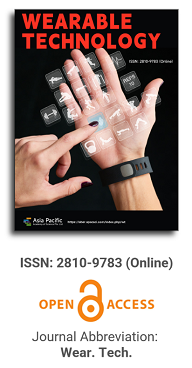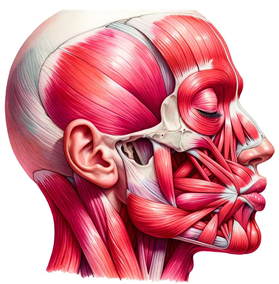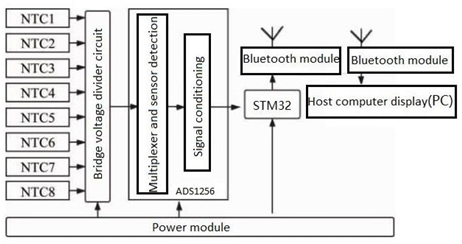

This paper delves deeply into the innovative realm of integrating human emotions with wearable technology. The primary focus is on the conceptualization and development of a kiss transfer device that harnesses the power of wearable technology to bridge the physical gap in human-human interactions. By investigating the intricate nuances of the human-human kissing process, the research seeks to replicate this intimate gesture through a technological medium. The paper not only elaborates on the anatomy, evolution, and hormonal dynamics of kissing but also underscores the transformative potential of wearable technology in capturing and transmitting these intimate moments. This exploration opens up new horizons for long-distance relationships, offering a tangible touchpoint that goes beyond traditional communication methods. Through this pioneering work, the research positions wearable technology as not just a tool for communication but as an extension of our human emotions and expressions.

Diabetic technology in India: Status, barriers, and future prospects
Vol 4, Issue 1, 2023
Download PDF
Abstract
This article provides a comprehensive review of diabetic technology in India. Researchers are persistently integrating novel technologies and enhanced medical knowledge to offer further avenues for improving the well-being of individuals with diabetes. Continuous patient engagement is essential by using highly effective technologies that address pertinent issues, as certain problems can be resolved with precision. India has a demographically large population, characterized by a substantial segment of individuals with diabetes. The estimated prevalence of diabetes in India is approximately 8%, with type 2 diabetes accounting for half of these occurrences. India’s per capita expenditure on health constantly falls behind that of other developing countries. Refined statistical data indicate that India’s healthcare expenditure is <50% of the average expenditure observed in the Organization for Economic Co-operation and Development (OECD) countries.
Keywords
References
- Ellahham S. Artificial Intelligence: The Future for Diabetes Care. The American Journal of Medicine. 2020; 133(8): 895-900. doi: 10.1016/j.amjmed.2020.03.033
- Anjana RM, Deepa M, Pradeepa R, et al. Prevalence of diabetes and prediabetes in 15 states of India: Results from the ICMR-INDIAB population-based cross—Sectional study. Lancet Diabetes Endocrinol. 5(8): 585-596. doi: 10.1016/S2213-8587(17)30174-2
- Hasni U, Piper ME, Lundquist J, et al. Screen-Printed Fabric Antennas for Wearable Applications. IEEE Open Journal of Antennas and Propagation. 2021; 2: 591-598. doi: 10.1109/ojap.2021.3070919
- Khajeh-Khalili F, Khosravi Y. A novel wearable wideband antenna for application in wireless medical communication systems with jeans substrate. The Journal of The Textile Institute. 2020; 112(8): 1266-1272. doi: 10.1080/00405000.2020.1809909
- Alqadami ASM, Nguyen-Trong N, Stancombe AE, et al. Compact Flexible Wideband Antenna for On-Body Electromagnetic Medical Diagnostic Systems. IEEE Transactions on Antennas and Propagation. 2020; 68(12): 8180-8185. doi: 10.1109/tap.2020.2996815
- Pei R, Leach M, Lim EG, et al. Wearable Belt Antenna for Body Communication Networks. IEEE Antennas and Wireless Propagation Letters. 2020; 19(12): 2043-2047. doi: 10.1109/lawp.2020.3021677
- Mu G, Ren P. A Compact Dual-Band Metasurface-Based Antenna for Wearable Medical Body-Area Network Devices. Journal of Electrical and Computer Engineering. 2020; 2020: 1-10. doi: 10.1155/2020/4967198
- El Gharbi M, Fernández-García R, Ahyoud S, et al. A Review of Flexible Wearable Antenna Sensors: Design, Fabrication Methods, and Applications. Materials. 2020; 13(17): 3781. doi: 10.3390/ma13173781
- Joshi R, Podilchak SK, Anagnostou DE, et al. Analysis and Design of Dual-Band Folded-Shorted Patch Antennas for Robust Wearable Applications. IEEE Open Journal of Antennas and Propagation. 2020; 1: 239-252. doi: 10.1109/ojap.2020.2991343
- SarestoNiemi M, Pomalaza-raez C, Bi Z, et al. Comprehensive Study on the Impact of Sternotomy Wires on UWB WBAN Channel Characteristics on the Human Chest Area. IEEE Access. 2019; 7: 74670-74682. doi: 10.1109/access.2019.2920067
- Kannagi V, Jawahar A. Epidermal antenna in palmar arch region for anaemia detection to avoid peripheral perfusion artifact in optical sensor during hemoglobin measurement. Microsystem Technologies. 2019; 26(5): 1427-1435. doi: 10.1007/s00542-019-04675-x
- Ding S, Koulouridis S, Pichon L. Design and characterization of a dual-band miniaturized circular antenna for deep in body biomedical wireless applications. International Journal of Microwave and Wireless Technologies. 2020; 12(6): 461-468. doi: 10.1017/s1759078720000197
- Yousefnia M, Ebrahimzadeh A, Dehmollaian M, et al. A Time-Reversal Imaging System for Breast Screening: Theory and Initial Phantom Results. IEEE Transactions on Biomedical Engineering. 2018; 65(11): 2542-2551. doi: 10.1109/tbme.2018.2807799
- Das S, Mitra D. A Compact Wideband Flexible Implantable Slot Antenna Design with Enhanced Gain. IEEE Transactions on Antennas and Propagation. 2018; 66(8): 4309-4314. doi: 10.1109/tap.2018.2836463
- Hu X, Yan S, Vandenbosch GAE. Wearable Button Antenna for Dual-Band WLAN Applications with Combined on and off-Body Radiation Patterns. IEEE Transactions on Antennas and Propagation. 2017; 65(3): 1384-1387. doi: 10.1109/tap.2017.2653768
- Lee H, Tak J, Choi J. Wearable Antenna Integrated into Military Berets for Indoor/Outdoor Positioning System. IEEE Antennas and Wireless Propagation Letters. 2017; 16: 1919-1922. doi: 10.1109/lawp.2017.2688400
- Hasan MN, Tamanna S, Singh P, et al. Cylindrical Dielectric Resonator Antenna Sensor for Non-Invasive Glucose Sensing Application. In: Proceedings of the 6th International Conference on Signal Processing and Integrated Networks (SPIN); 2019. doi: 10.1109/SPIN.2019.8711633
- Jang C, Park JK, Lee HJ, et al. Temperature-Corrected Fluidic Glucose Sensor Based on Microwave Resonator. Sensors. 2018; 18(11): 3850. doi: 10.3390/s18113850
- Sethi WT, Ashraf MA, Alshebeili SA, et al. Thumb positioning analysis of new elliptical‐shaped microwave sensors for non‐invasive glucose monitoring. Electronics Letters. 2018; 54(9): 553-554. doi: 10.1049/el.2018.0128
- Turgul V, Kale I. Simulating the Effects of Skin Thickness and Fingerprints to Highlight Problems with Non-Invasive RF Blood Glucose Sensing from Fingertips. IEEE Sensors Journal. 2017; 17(22): 7553-7560. doi: 10.1109/jsen.2017.2757083
- Masihi S, Panahi M, Maddipatla D, et al. Development of a Flexible Tunable and Compact Microstrip Antenna via Laser Assisted Patterning of Copper Film. IEEE Sensors Journal. 2020; 20(14): 7579-7587. doi: 10.1109/jsen.2020.2987318
- Abutarboush HF, Li W, Shamim A. Flexible-Screen-Printed Antenna with Enhanced Bandwidth by Employing Defected Ground Structure. IEEE Antennas and Wireless Propagation Letters. 2020; 19(10): 1803-1807. doi: 10.1109/lawp.2020.3019462
- Bharadwaj R, Swaisaenyakorn S, Parini CG, et al. Impulse Radio Ultra-Wideband Communications for Localization and Tracking of Human Body and Limbs Movement for Healthcare Applications. IEEE Transactions on Antennas and Propagation. 2017; 65(12): 7298-7309. doi: 10.1109/tap.2017.2759841
- Mao CX, Vital D, Werner DH, et al. Dual-Polarized Embroidered Textile Armband Antenna Array with Omnidirectional Radiation for On-/Off-Body Wearable Applications. IEEE Transactions on Antennas and Propagation. 2020; 68(4): 2575-2584. doi: 10.1109/tap.2019.2951517
- Zhang W, Du Y, Wang ML. Noninvasive glucose monitoring using saliva nano-biosensor. Sensing and Bio-Sensing Research. 2015; 4: 23-29. doi: 10.1016/j.sbsr.2015.02.002
- Agustini D, Bergamini MF, Marcolino-Junior LH. Tear glucose detection combining microfluidic thread based device, amperometric biosensor and microflow injection analysis. Biosensors and Bioelectronics. 2017; 98: 161-167. doi: 10.1016/j.bios.2017.06.035
- Wang R, Zhai Q, An T, et al. Stretchable gold fiber-based wearable textile electrochemical biosensor for lactate monitoring in sweat. Talanta. 2021; 222: 121484. doi: 10.1016/j.talanta.2020.121484
- Chen Y, Lu S, Zhang S, et al. Skin-like biosensor system via electrochemical channels for noninvasive blood glucose monitoring. Science Advances. 2017; 3(12). doi: 10.1126/sciadv.1701629
- Saha S, Cano-Garcia H, Sotiriou I, et al. A Glucose Sensing System Based on Transmission Measurements at Millimetre Waves using Micro strip Patch Antennas. Scientific Reports. 2017; 7(1). doi: 10.1038/s41598-017-06926-1
- Vrba J, Karch J, Vrba D. Phantoms for Development of Microwave Sensors for Noninvasive Blood Glucose Monitoring. International Journal of Antennas and Propagation. 2015; 2015: 1-5. doi: 10.1155/2015/570870
- Xiao X, Li Q. A Noninvasive Measurement of Blood Glucose Concentration by UWB Microwave Spectrum. IEEE Antennas and Wireless Propagation Letters. 2017; 16: 1040-1043. doi: 10.1109/lawp.2016.2618946
- Mahnashi Y, Qureshi KK, Al-Shehri AA, et al. Design and Experimental Validation of a Noninvasive Glucose Monitoring System Using RF Antenna-Based Biosensor. IEEE Sensors Journal. 2023; 23(3): 2856-2864. doi: 10.1109/jsen.2022.3227382
- Sindhuja S, Kanniga E. Flexible Antenna Sensor in Thumb Spica Splint for Noninvasive Monitoring of Fluctuating Blood Glucose Levels. IEEE Sensors Journal. 2023; 23(1): 544-551. doi: 10.1109/jsen.2022.3223948
- Puthussery VV. What is the Prevalence of Diabetes in India? Current Data and Stats? Available online: https://diabetes.co.in/what-is-the-prevalence-of-diabetes-in-india-current-data-and-stats (accessed on 25 March 2024).
Supporting Agencies
Copyright (c) 2024 S. Sindhuja, E. Kanniga
License URL: https://creativecommons.org/licenses/by/4.0/

Prof. Zhen Cao
College of Information Science & Electronic Engineering, Zhejiang University
China, China
Processing Speed
-
-
-
- <5 days from submission to initial review decision;
- 62% acceptance rate
-
-
Asia Pacific Academy of Science Pte. Ltd. (APACSCI) specializes in international journal publishing. APACSCI adopts the open access publishing model and provides an important communication bridge for academic groups whose interest fields include engineering, technology, medicine, computer, mathematics, agriculture and forestry, and environment.





